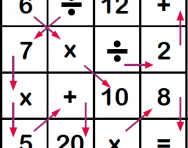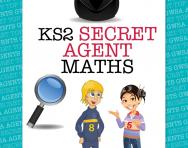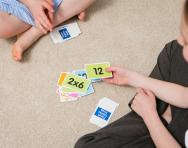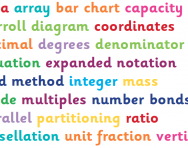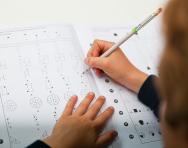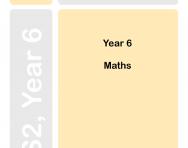The beginner's guide to 11+ maths
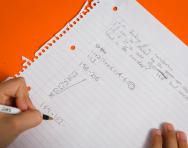
Maths is an essential skill for every child, and for those who are taking the 11+, it's even more important. Your child's ability in maths will be tested as part of the exam, and knowing what to expect will give them the confidence they need to do well. So what does the 11+ maths test involve?
What is the format of the maths test?
The maths test varies across areas and schools, but every child sitting the 11+ exam will have their maths skills assessed in some way.
For some schools, this takes the form of a separate maths test, commonly multiple choice in style. This can vary in time from 30 minutes to an hour. Some schools set a single paper that combines both English and maths-based questions. Others may assess your child’s basic maths skills via a verbal reasoning test, which can be multiple choice or written answer in format, and usually takes 45 to 50 minutes.
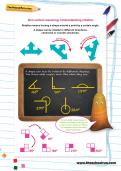
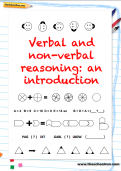
Prepare For The 11+ Exam
- Essential English and maths skills
- Verbal and non-verbal reasoning questions
- Reading comprehension & CLOZE tests
Some schools now set numerical reasoning tests in a bid to make the exams more ‘tutor proof.’ These are usually 45 to 50 minutes long and multiple choice in format. These tests consist of a combination of mental maths and multi-step problem solving questions that require children to use their logic to think about which mathematical methods they need to unpick the information and find the answer.
Because the type of test varies so much, it’s important to visit the individual websites of the schools you’re interested in to find out more detailed information about the tests they set.
What sort of skills are tested?
The 11+ maths test is designed to see how well your child understands numbers and can solve mathematical problems. The maths tests are based on what your child has been taught during Key Stage 2 with most of the questions equivalent to a National Curriculum level 5: (above average level for a Year 6 pupil).
'Some questions are based on concepts taught in the classroom, but at a more difficult level than children will have experienced in school,' explains Dr Ian Helm of exam board GL Assessment. 'As a result, the papers focus on your child’s skills in particular areas as much as on their existing knowledge.'
What skills do children need to be able to perform well?
Your child needs to be able to think and calculate quickly. 'Children need to have strong core maths skills in order to do well,' explains Jennie Varley, Vice Chairman of the National Grammar Schools Association (NGSA). 'They need to be able to work quickly and accurately. Ensuring they have a sound knowledge of their times tables and the four basic operations (addition, subtraction, division and multiplication) is key.'
What questions are involved?
In essence the 11+ maths tests should cover the National Curriculum syllabus and tends to cover four different areas. So you can expect questions on:
- Number - which will include decimals, percentages and fractions as well as the four basic operations (addition, subtraction, multiplication and division).
- Algebra - which will include equations and formulae.
- Shape and space (geometry) - which will include volume, area, co-ordinates and nets.
- Data handling - which will focus on statistics and probability, the idea of chance and averages.
Maths skills are also assessed in verbal reasoning tests. There are 21 different types of verbal reasoning questions, and the maths-based questions include number sequencing, completing the sum and finding related numbers.
Calculators are not allowed in any of the 11+ entrance exams.
Who administers the test?
Most of the 11+ exams are either set by GL Assessment or CEM (University of Durham) but some grammar schools choose to write their own exams.
Do all grammar schools require children to take a maths test?
Not all schools set a separate maths exam; some use a combined English and maths paper, or set a numerical reasoning test. But all grammar schools assess children’s maths skills in some way.
How can you help their child prepare?
It’s important to get your child’s mental maths up to scratch, work on their times tables and make sure their basic maths skills are strong enough to help them to solve maths problems quickly. 'Make preparation fun wherever possible,' says Jennie. 'Practice papers help familiarise children with what to expect, but introducing games, puzzles and Sudoku are also good ways of developing a child’s speed, accuracy and confidence.'
'It helps to familiarise children with the style and format of the test beforehand, and tackling a practice paper gives children valuable experience of managing their time effectively,' explains Ian. 'Achieving a good score in a practice test can also boost a child’s confidence and reduce their anxiety in the run-up to the examination.'
'In the run up to the 11+, I tried really hard to secure my son’s maths skills by introducing numbers wherever possible into everyday situations. We cooked together and talked about measurement, we shopped together and he added up the price of items in my trolley, and we set a family times table challenge that we completed at the dinner table. That way, I felt we could practise little and often in a way that didn’t feel too pressured,' says Kathryn Golden, mum to Theo, 11.

Give your child a headstart
- FREE articles & expert information
- FREE resources & activities
- FREE homework help
